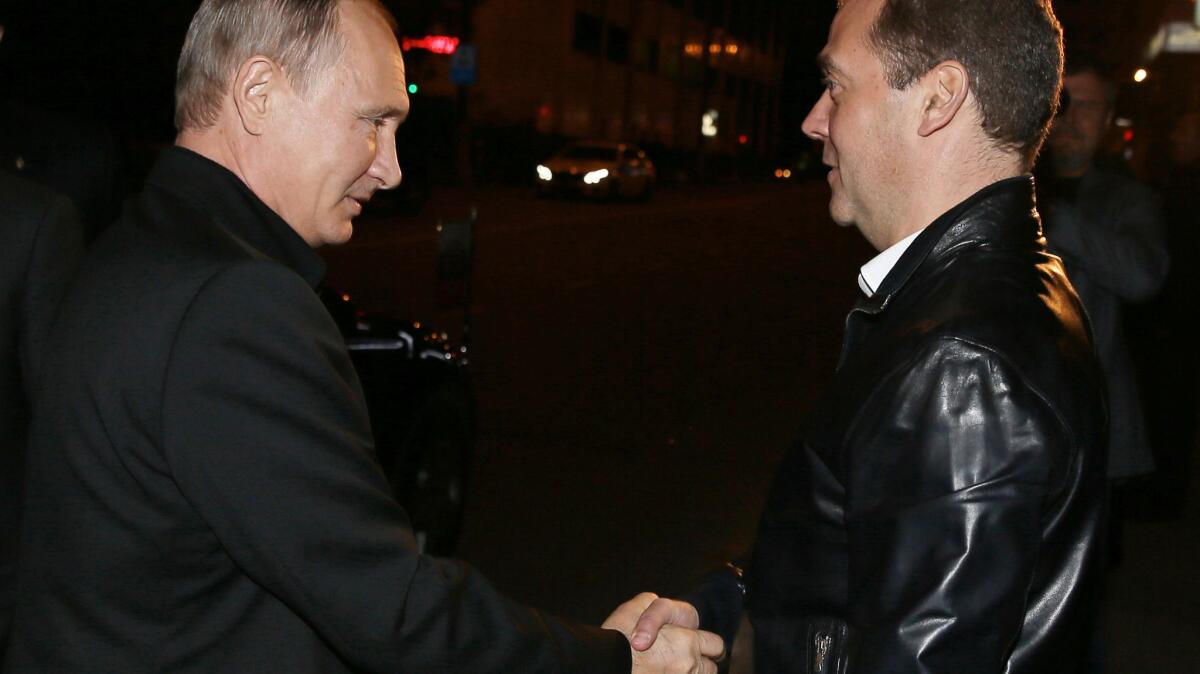Putin’s party may have just won another victory, but its performance is underwhelming
- Share via
Reporting from Moscow — President Vladimir Putin’s ruling party easily outdistanced its rivals in parliamentary elections Sunday, but it was a lackluster victory that suggested the Russian leader’s brand may be growing stale.
United Russia, the pro-Kremlin behemoth an opposition leader once dubbed the “party of crooks and thieves,” won less than 45% of the vote for 450 seats in the State Duma, Russia’s lower house of parliament, according to preliminary results announced by the Central Election Committee on Sunday night.
No other party came close. The nationalist LDPR party and the Communists competed for the second spot with 18% and 17% of the vote, respectively.
Still, it was United Russia’s lowest result in 15 years – and came in an election with turnout of less than 40% of eligible voters. The election was a tangible blow to Putin, who founded the party at the dawn of his rule.
The 63-year-old leader put on a brave face when announcing its victory.

“The result is what it is,” Putin, smiling and casual, said during a televised meeting with party officials. “One can surely say the party has achieved a very good result.”
In recent years, he distanced himself from the party as its approval ratings suffered amid endless corruption scandals and a crippling economic crisis.
United Russia’s previous victory in 2011 with 49% of the vote prompted calls of fraud and triggered massive urban protests throughout Russia that shook the Kremlin. In 2007, the party had won almost 65% of the vote during a period of impressive economic growth fueled by high oil prices.
Still, United Russia appeals to many people because of its omnipresence on Kremlin-controlled television, and the lack of a genuine choice.
United Russia “has been criticized a lot in recent years, but the critics are hired by [President] Obama,” said Vasily Karatayev, a 43-year-old construction worker who cast his ballot for a United Russia candidate in a central Moscow district.
His opinion echoes a choir of Kremlin loyalists that eagerly accepted Putin’s tilt to neoconservative and belligerently anti-Western policies after his return to a third presidency in 2012. Despite United Russia’s fading approval ratings, supporters insist the continued tensions with the West will ensure Putin’s reelection in the 2018 presidential vote.
“Obama is guilty of the [economic] crisis,” political analyst and former lawmaker Sergei Markov said, adding that the U.S. president is waging a “hybrid” war against Russia that includes economic and diplomatic pressure, critical media reports and support of anti-Russian governments in the former Soviet republics of Ukraine and Georgia.
“By attacking Russia, the U.S. will make Putin an eternal president,” Markov said.
Apart from United Russia, 13 other parties ran for seats in the Duma, but only three won more than 5% of the vote necessary for a Duma presence. Besides the LDPR and the Communists, the Just Russia social democratic party received just under 7%.
The three parties are part of the so-called systemic opposition. Critics say their political stance and anti-Kremlin rhetoric are staged because they eagerly vote for most of United Russia’s bills.
The remaining 10 parties that took part in the vote – liberal democrats, militant nationalists and greens – got well below the 5% threshold.
Parnas, the liberal People’s Freedom Party, received about 0.7% of the vote, according to official results, a far cry from the 10% predicted by its founder, former Prime Minister Mikhail Kasyanov.
Every party except United Russia filed hundreds of complaints with Russia’s last independent election monitor, Golos, which means “voice.”
The vocabulary of the complaints sounded almost festive. “Cruising” meant multiple voting with absentee ballots. “Carousel” was a replacement of one’s empty ballot with a pre-filled one – and an exchange of the empty ballot for money.
The parties, and Golos, also charged that there was evidence of routine ballot stuffing and swaps of votes for alcohol.
For instance, there were reports that 3 liters of beer were offered for each United Russia vote in the city of Novosibirsk. And in the Urals town of Troitsk, there were allegations that a vote could fetch a bottle of vodka or up to $15.
Two dozen videos posted online showed alleged and sometimes comical evidence of vote rigging at polling stations, mostly public schools, where election officials were seen stuffing ballots or allowing people to vote without proper documents.
While turnout was low across the board, some polling stations in Russia-annexed Crimea were almost empty.
Crimean Tatars, an indigenous Muslim minority, largely boycotted the vote, activists and independent media reports said. The city of Bakhchisaray, Crimea’s onetime capital, and adjacent villages with a Tatar majority, ignored the vote, they said.
“I am not going to the election, because this is not my government and not my country,” Nariman Dzhelyalov, deputy chairman of the Mejlis, an informal Tatar parliament that was outlawed by Moscow, said in a statement.
Dozens of Tatars have been detained, arrested, searched and harassed by Russian authorities since the 2014 annexation.
Mirovalev is a special correspondent.
ALSO
U.S. says it carried out strike that may have inadvertently killed 60 Syrian soldiers
Dare to be dull. Vibrant Berlin seems ready to reelect its plodding mayor
A year later, legacy of refugee crisis has Greeks fearing paradise lost
More to Read
Sign up for Essential California
The most important California stories and recommendations in your inbox every morning.
You may occasionally receive promotional content from the Los Angeles Times.










